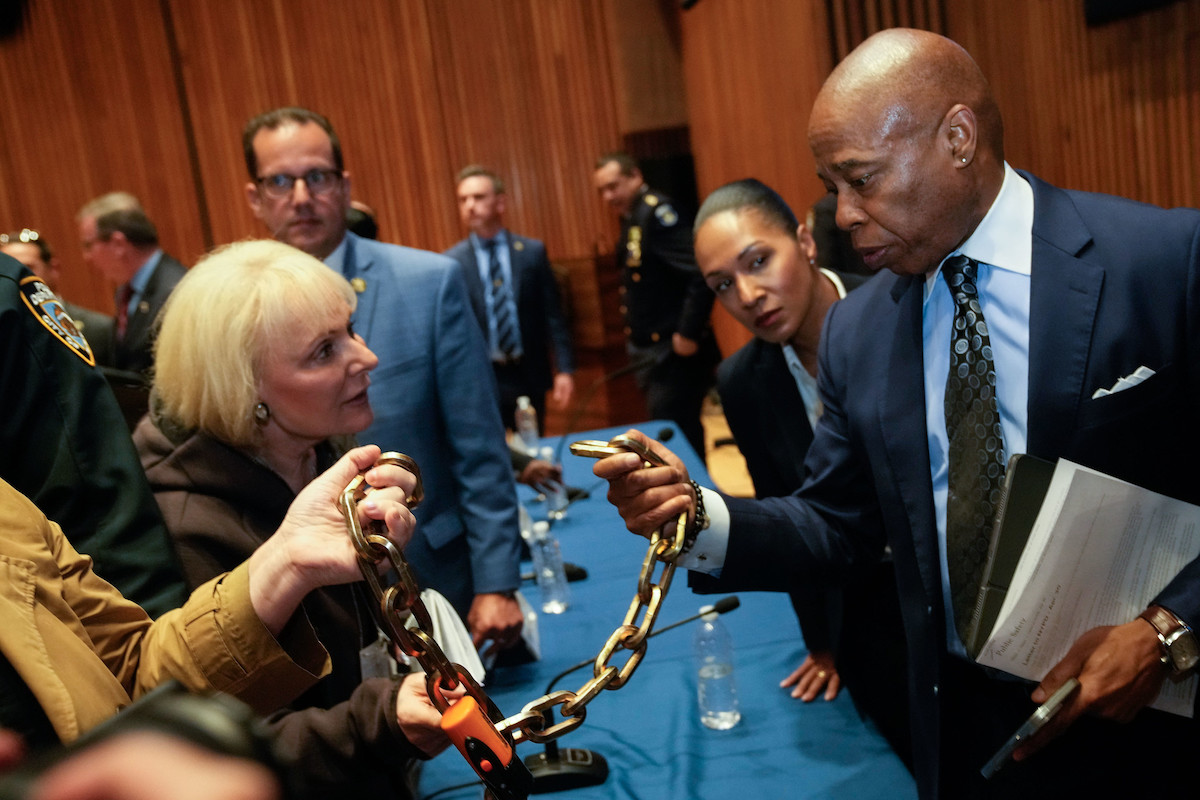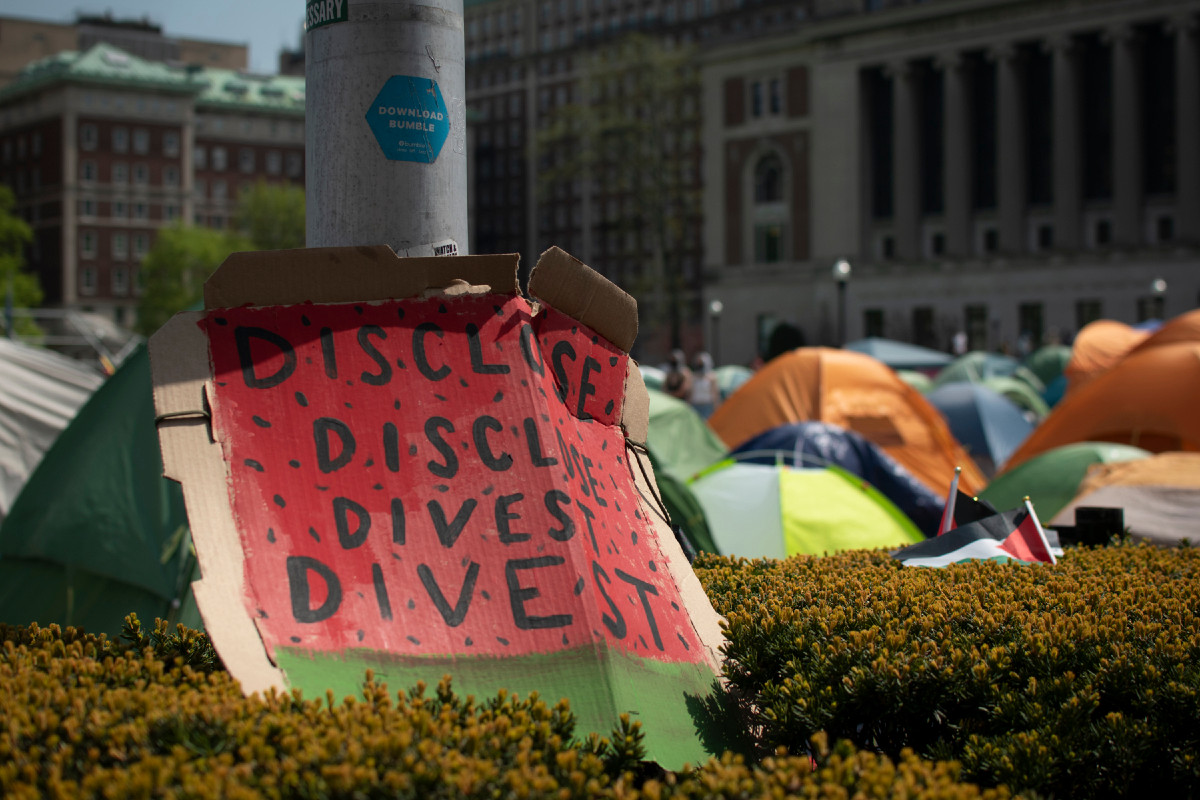New York Times Writers Call Out the Paper’s Anti-Trans Onslaught [UPDATED]
“This is not quite business as usual anymore,” one of the organizers of an open letter to the NYT told Hell Gate.
8:34 AM EST on February 15, 2023

(Jakayla Toney / Unsplash)
On Wednesday morning, a group of almost 200 journalists and writers released an open letter addressed to the New York Times, sharing their "serious concerns about editorial bias in the newspaper’s reporting on transgender, non-binary, and gender nonconforming people" and criticizing how the Times has "follow[ed] the lead of far-right hate groups in presenting gender diversity as a new controversy warranting new, punitive legislation."
The open letter, whose signees include regular contributors to the Times and prominent writers and journalists like Ed Yong, Lucy Sante, Roxane Gay, and Rebecca Solnit, comes at a time when far-right extremist groups and their analogues in state legislatures are ramping up their attacks on trans young people; just yesterday, South Dakota became the sixth state to ban or restrict gender-affirming care for youth, efforts that one conservative activist recently acknowledged was merely the first step toward their goal of banning transition care altogether.
In recent years and months, the Times has decided to play an outsized role in laundering anti-trans narratives and seeding the discourse with those narratives, publishing tens of thousands of handwringing words on trans youth—reporting that is now approvingly cited and lauded, as the letter writers note, by those who seek to ban and criminalize gender-affirming care.
As the critic Tom Scocca wrote of the Times' reporting, "This is pretty obviously—and yet not obviously enough—a plain old-fashioned newspaper crusade. Month after month, story after story, the Times is pouring its attention and resources into the message that there is something seriously concerning about the way young people who identify as trans are receiving care." He then asked: "If it's not a problem, why else would it be in the paper?"
Why indeed. Hell Gate spoke with Jo Livingstone, an award-winning critic and writer who helped organize the open letter, on their criticisms of the New York Times reporting, why they think the Times is laundering anti-trans narratives, and what the letter signers hope to achieve.
This interview has been lightly condensed and edited for clarity.
Hell Gate: What led you and the other organizers to put together this open letter?
Jo Livingstone: I think there's been a real urgency around the Times coverage. As we say in the letter, the question of New York Times articles making their way into [state] legislatures, into the courts, is something that's really, really hitting the fan right now. I think that was why it felt like the right moment. And it felt like a good group of people.
It goes to show that this moment, this feeling about justice and trans people in the news, it's aligning a lot of different sectors—different types of journalists, different types of people.
What I want to underwrite is that sometimes, no matter how many queer people you get in a piece, or an action, quote unquote regular people are not necessarily going to respond, because papers like the New York Times have really normalized dismissing the claims of trans people as being extreme. But this honestly feels like a very representative slice of people [who] make this damn newspaper.
You mentioned how the Times reporting has made its way into a lot of legislatures in states where elected officials are trying to ban trans youth from accessing health care, banning trans youth from sports. Can you talk a little bit about the Times reporting itself, and why you and so many other people think that it's so flawed?
I think that the Times has used the deniability of, "we're just reporting the news," to kind of protect itself from itself. I believe that there are editors at the New York Times who believe that they are covering this issue properly, that it's in the public interest to present both sides.
I think one of the really key points that I want people to feel hits home is that there is no real separation between the way we use language and the idea of neutrally covering a subject. To suggest that there is no relationship between the way that we are using language at the newspaper to discuss people's lives, people who are also being debated in court, is to really be willfully ignorant of what it is that we do as journalists.
And I wanted to make sure that we have a history [in the open letter] about the way that everyday language has been informed by the New York Times when it comes to, you know, debating gay people in the '70s, '80s, and '90s. Because I think that it's a really close analogue, uncomfortably close.
What does it say to you about the state of media, that the sorts of narratives that the Times is lifting up in their "we have to tell both sides" journalism, initially spread outward from right-wing outlets and organizations?
I'm from London. I left the UK when I was 20, 21, to come to New York for grad school. And to be able to step outside of the way that the British conceive of respectability, and what is normal, acceptable, it really, really changed the way that I saw everything. And from that vantage point, I have seen the parameters of what is acceptable to say in public about people who are trans or just don't hate trans people, become messier and messier, and more and more organized around the profit-generating outrage cycle, in the British media over the last decade, to be frank.
And I really think that American newspapers know that if you can get BBC watchers and Guardian readers to participate in an outrage cycle that makes money for the newspaper and just keeps the distraction of an outrage rolling in a time of great political consequence in British history, then it's a win-win for the newspaper.
And I think that the New York Times sees that. They know that this is engaging people, in the same way that homophobic content engaged homophobes. It's not necessarily a rare form of prejudice. But it's really unusual. I think you, other journalists, all of the undersigned of the letter, agree that this is not quite business as usual anymore.
It sounds like you're making an argument that kind of boils down to, they're pushing out this ideology and these narratives for clicks.
Yes. There are really not that many trans people in America. There aren't that many trans children in America. This is an issue which affects a lot of people, in theory. In practice, maybe not so much.
But because it's a question that seems to relate to institutions that people feel a lot of ownership over, for example, schools, especially primary schools, you know, "what are people doing with my child when I'm not around?" I think that there's a paranoia at the heart of what makes people want to read about this stuff, which is only getting more and more intense, the more the coverage.
Newspapers have a passive explanation—what people want to read is the news that we report. And just to go back to what I was saying before, that is a willful misreading of what journalism does in society.
Something that you also raise in the open letter is that in many instances, the reporting is also just bad reporting. For example, in many of the stories that you reference, the writers don't state the organizational affiliations that individuals have, or state the full agenda that people have—all information that might actually inform a reader about their motivations.
You're absolutely right. The reporting failures that we outline in the letter, they matter. When they appear in the work of somebody like Katie J.M. Baker, who has a really, really strong reputation as an investigative journalist, it does make you wonder, what is going wrong, on this particular subject? Is it a silo, that there are a few people who feel like they want to be in control of this? And so they're pushing the wrong priorities? I don't know.
But it's not what Times readers deserve. It's not what they expect, and it's not what they deserve, and it's not what their employees and their contributors deserve either. We have a stake in keeping this newspaper as high-quality as it can be.
And I think that the range of people who have signed on, including lots of well-known cisgender people, straight people, I think it goes to show that the Times can't dodge the issue of reporting by saying, "Oh, well, it's a source, a source is always going to have their own agenda to push."
What else do you think or suspect is driving the coverage that we've seen recently?
I don't know. I would suspect that it's coming from someone quite senior within the organization, and that their position is defensible on the grounds of traffic. Honestly, if I were a transphobe at the fucking New York Times, that's how I would do it. I would say, "This is part of public discourse." Just look at how famous JK Rowling is. Let's go.
It honestly does feel like they've stepped out of their brand on this subject. And it's just going to keep perpetuating until they fix it.
Speaking of fixing things, what do you hope will be the outcome of this open letter?
I hope that the standards editor Philip Corbett takes it seriously. I hope that he and his other colleagues in senior positions at the paper, take seriously the feelings of this large number of people who create the newspaper. And my hope is that we hear back from Mr. Corbett.
There's a reason that we framed our letter as a complaint to an individual person. There are a lot of different forms of advocacy going on, around trans people, our rights, and the way that they're discussed. But this call is really coming from inside the house.
Are y'all asking the people who signed on to, for example, agree to not contribute to the Times until there is a response? Is there anything concrete like that being planned?
No, our ask was to join us. And I think that that was a hugely generous act for every single person who signed the letter. And I just want to emphasize that there will be more letters and more kinds of venues for nonprofits and institutions to sign on.
We made a gathering space that people have just come to us, ready to support. And so it's been a real emotional rollercoaster. And I am proud of and grateful for everybody who is taking a risk on their future engagement by this employer, to stand with us. So when I think about all of that bravery, I feel okay, and can take a nap.
Updated (3/2/23, 11:27 a.m.): This story has been updated to include the response from Philip B. Corbett, the associate managing editor for standards at the New York Times, which was sent to the letter organizers on Wednesday morning, two weeks after they published their open letter.
We have reprinted his response in full. You can judge for yourself whether this is a serious, carefully considered response to concerns about editorial bias, or whether this is more of the same:
Thank you for reaching out with these serious and sincere concerns. I'm sorry I wasn't available to respond immediately. But as I'm sure you're aware, your critique prompted plenty of robust discussion inside and outside The Times, and several of my colleagues have responded and discussed these issues in a variety of forums.
We strive always to be open to good-faith criticism and input about our journalism, and we've received lots of feedback on the challenge of covering trans issues fully and fairly. I can promise that we will continue to have careful, thoughtful discussions going forward—though among our colleagues, we believe those discussions should be internal, not public.
I recognize how strongly you feel about these concerns, and I know that for you and for many of my colleagues, this is much more than an abstract journalistic debate. That said, we respectfully but firmly disagree with the idea that The Times's coverage of trans issues has been biased or transphobic.
Our journalism strives to explore, interrogate and reflect the experiences, ideas and debates in society—to help readers understand them. I think our reporting has done that. We have pursued independent reporting on transgender issues that has included profiling groundbreakers in the movement; challenges and bigotry faced by the community; and how society is grappling with debates about medical care and treatment. I believe the specific news stories cited in your letter were entirely in keeping with our journalistic standards. They reported deeply and empathetically on issues of care and well-being for trans people. (I would also note that no factual errors have been cited in that reporting.)
To give an even fuller picture of our efforts, I've included links to other examples of our trans coverage below.
Once again, thanks for your letter. I know my response will not address all your concerns, but I hope I can assure you that we take those concerns seriously, and will continue to do so.
Sincerely,
Philip B. Corbett
Associate Managing Editor for Standards
The New York Times
Coverage Examples The stories cited in your letter represent only a small portion of our coverage. You can see the breadth of our coverage on transgender issues across both news and opinion at this link. For many years, our newsroom reporters have written extensively about threats to LGBTQ people and challenges to their rights, including violence and other hate crimes against trans Americans and political and legal challenges to trans rights in state capitals. Our reporters closely covered President Trump's ban on trans people serving in the military. Our wide-ranging newsroom coverage includes evocative articles on the lives of trans adults and youth in America and unflinching looks at the political forces threatening trans rights. We profiled Elizabeth Purchell, a queer-film historian, and Mariah Lopez, who has led the legal battle for transgender people who are homeless in New York City. We examined the growth in the number of people identifying as trans in the U.S., and scrutinized discrimination against transgender people in Pakistan.Our editorial board has long championed trans rights and recently in our Opinion pages a columnist advocated for the urgent need for trans rights in America, a wide-ranging focus group discussed elevating the voices of trans Americans, a columnist argued for privacy among trans youth and a gripping short film documented a Mexican trans man's journey. Our Opinion leadership remains proud of a series of far-sighted editorials in 2015 about the quest for transgender equality.
Thanks for reading!
Give us your email address to keep reading two more articles for free
See all subscription optionsStay in touch
Sign up for our free newsletter
More from Hell Gate
NYPD Did ‘Amazing Job’ Arresting Hundreds of College Students to Protect Them From ‘Outside Agitators,’ NYPD Says
"There is a movement to radicalize young people," Mayor Eric Adams said. "And I'm not going to wait until it's done and all of a sudden acknowledge the existence of it."
Inside the NYPD’s ‘Dystopian’ Raid on Columbia Student Protesters
Columbia admin and the NYPD tried to keep the press from seeing Tuesday night's massive raid up close. They didn’t quite succeed.
Rent Guidelines Board Lives Up to ‘Rent Increase Board’ Reputation
And more news for your Wednesday.
NYPD Raids CUNY’s City College, Violently Arrests Students, Then Hoists American Flag
Hundreds of officers burst through the City College gates, clearing out a Gaza solidarity encampment.
Columbia’s Student Protesters Are Still Schooling the Administration
Less than 24 hours after the university administration announced a hard line on students demanding divestment from the war on Gaza, the students escalated their protest, taking over a university building.




